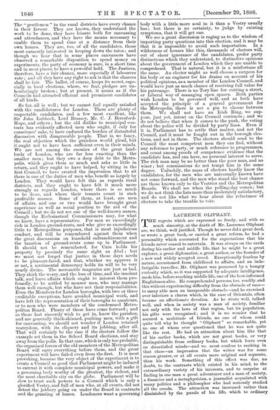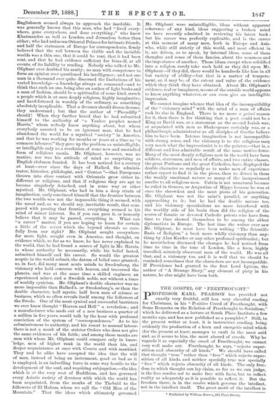LAURENCE OLIPHANT.
rilllregrets which are expressed so freely, and with so E much sincerity, at the death of Mr. Laurence Oliphant are, we think, well justified. Though he never did a great deed, or wrote a great book, or carried a great reform, he bad a personality which accounted for the expectations that his friends never ceased to entertain. It was always on the cards during his earlier and middle life, that he might be a great explorer, a great diplomatist, a great author, or the founder of a new and widely accepted creed. Exceptionally fearless by nature, accustomed from childhood to affairs, and an inde- fatigable traveller, Mr. Oliphant was possessed by a hungry curiosity which, as it was supported by adequate intelligence, made him, before reaching middle life, one of the best-informed Englishmen alive. He comprehended persons, too, readily, and this without experiencing difficulty from the obstacle of race— to many able men an insuperable obstacle—and he exercised over inferiors a charm which, in the case of Orientals, often became an affectionate devotion. As he Wrote well, talked well, and when in society was a man of society, familiar not only with the laws of that region, but its population, his gifts were recognised ; and it is no wonder that he secured a multitude of friends, no one of whom could quite tell why he thought " Oliphant " so remarkable, yet no one of whom ever questioned that he was not quite like the rest. He had an attraction about him like that of his earlier books, which are not great books, or very distinguishable from ordinary books, but which leave even on dissatisfied minds—and we must confess to ranking in that class—an impression that the writer was for some reason greater, or at all events more original and separate, than his work. Something of this effect was due, no doubt, to the contrasts which existed in his mind, to the extraordinary variety of his interests, and to surprise at finding in one man a great adventurer and a man of society,
a financier and a metaphysician, a journalist acquainted with many politics and a philosopher who had seriously studied all the creeds. The attraction was increased rather than diminished by the puzzle of his life, which to ordinary Englishmen seemed always to approach the insoluble. It was generally known that this man, who had "lived every- where, gone everywhere, and done everything ;" who knew Khatmandoo as well as London, and Jerusalem better than either; who had unknown Oriental Princes for intimate friends, and half the statesmen of Europe for correspondents, firmly • believed that the veil between the visible and the invisible worlds was a thin one, that it could be rent, that it had been rent, and that he had evidence sufficient for himself, at all events, of its liability to rending. Nobody who talked to Mr. Oliphant ever doubted his sanity ; no man with competence to form an opinion ever questioned his intelligence ; and not one man in a thousand ever quite discerned the limitations of his varied knowledge—a knowledge always at command—and to think that such an one, being also an author of light books and a man of fashion, should be a spiritualist of some kind, struck a people which is at once deeply religious, highly imaginative, and hard-fettered in worship of the ordinary, as something absolutely inexplicable. That a dreamer should dream dreams, they understand ; but that the author of " Piccadilly " should ! When they further heard that he had submitted himself to the authority of "a Yankee prophet named Harris," whom nobody knew anything about, but whom everybody asserted to be an ignorant man, that he bad abandoned the world for a mystical " society " in America, and that he was working for months or years at a time as "a common labourer," they gave up the problem as unintelligible, or intelligible only as a revelation of some new and unstudied form of religious mania. Mr. Oliphant, however, was no maniac, nor was his attitude of mind so surprising as English clubmen fancied. It has been noticed for a century at least—ever since the days of Halhed, the adminis- trator, historian, philologist, and " Gentoo "—that Europeans thrown into close contact with Orientals grow either in- different or religious, and that if religious they are apt to become singularly detached, and in some way or other mystical. Mr. Oliphant, who had in him a deep strain of imagination, early convinced himself that the frontier between the two worlds was not the impassable thing it seemed, with the usual and, as we should say, inevitable result, that com- pared with passing that frontier, everything seemed to his mind of minor interest. So, if you can pass it, or honestly believe that it may be passed, everything is. What can "a career" matter, if you are hoping to learn for certain a little of the secret which the beyond shrouds so care- fully from our sight? Mr. Oliphant sought everywhere for more light, sought even in America, and thought, on evidence which, so far as we know, he has never explained to the world, that he had found a source of light in Mr. Harris, to whose authority he necessarily, while his belief lasted, submitted himself and his career. So would the greatest sceptic in the world submit, the datum of belief once granted ; so, in fact, did many most acute minds to Swedenborg, the visionary who held converse with heaven, and traversed the planets, and was at the same time a skilled engineer, an experienced miner, and a Swedish noble, not without a trace of worldly cynicism. Mr. Oliphant's double character was no more impossible than Halhed's, or Swedenborg's, or than the double character, half mystic, half keen man of science or business, which so often reveals itself among the followers of the Swede. One of the most cynical and successful barristers we ever knew thought "Heaven and Hell" a revelation ; and a manufacturer who made out of a new business a quarter of a million in five years, would talk by the hour with profound conviction of the system of "correspondences." As to his submissiveness to authority, and his resort to manual labour, there is not a monk of the stricter Orders who does not give the same evidences of his faith ; and among those monks are men with whom Mr. Oliphant could compare only in know- ledge, men of higher rank in the world than his, and deeper acquaintance at once with Courts and with mankind. They and he alike have accepted the idea that the will of man, instead of being an instrument, good or bad as it is employed, is an indwelling force in some way hostile to the development of the soul, and requiring subjugation,—the idea which is at the very root of Buddhism, and has governed every Asiatic society of devotees with which the world has been acquainted, from the monks of the Thebaid to the followers of El Hakem, whom we call the "Old Man of the Mountain." That the ideas which ultimately governed Mr. Oliphant were unintelligible, ideas without apparent coherence of any kind, ideas suggesting a broken mind we have recently admitted in reviewing his latest book ; but his career was perfectly explicable, and is the career at this moment of many men, both in Europe and Asia, who, while still strictly of this world, and most efficient in it, are driven, so to speak, by internal ideas, some of them thoughts and some of them fancies, about the nearness and the importance of another. Those ideas, except when solidified into a religion, rarely take such hold as they did upon Mr. Oliphant—if they did, there would be hundreds like him in all but variety of ability—but that is a matter of tempera- ment, or, it may be, of the extent and value of the evidence which they think they have obtained. About Mr. Oliphant's evidence, real or imaginary, no one of the outside world appears to know anything whatever, or can even give an intelligible impression.
We cannot imagine whence that idea of the incompatibility of the "visionary mind" with the mind of a man of affairs took its rise in England. There is no more a priori reason for it, than there is for thinking that a poet could not be a King as David was, or a statesman as the second Isaiah was, or acquainted with men as Shakespeare certainly was, or a philanthropic administrator as all disciples of Goethe believe him to have been. Intense imagination is not incompatible with strong sense, and the visionary is to the religious man very much what the impressionist is to the painter,—that is, a different and less admirable result of the same motive-force- Many of the most deeply religious men in the world have been soldiers, statesmen, and men of affairs, and two entire classes, the great Puritans and the great Catholics, have displayed the double character so regularly as to make men of experience rather expect to find it in the pious, than to detect in them the weakly emotional nature so many of the inexperienced ascribe to all religious men. Calvin is not unnatural because he ruled in Geneva, or Augustine of Hippo because he was at once the shrewdest and the most pious of his generation. Mr. Oliphant was not the saint's parallel, or anything approaching to it ; but he had the double nature too, and his visionary speculations no more interfered with the worldly side of his brain than did the religion of the scores of fanatic or devoted Catholic priests who have from time to time showed themselves to be among the ablest diplomatists in Europe. The last time the writer ever saw Mr. Oliphant, he must have been writing "The Scientific Basis of Religion," a book more wildly visionary than any- thing by Alan Kardec or any other professed spiritualist; but he nevertheless discussed the changes he had noticed from time to time in the tone of London, like a keen, highly travelled, minutely observant man of the world. He was all that, and a visionary too, and it is well that we should be reminded sometimes that the characters are not incompatible. If Providence bad granted to the first Lord Lytton, the author of "A Strange Story," any element of piety in his nature, he also might have been both.



































 Previous page
Previous page